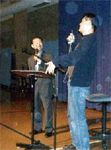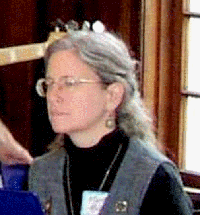 I am absolutely confident that the Lord is calling Christians of all denominations to bless one another across the denominational lines that separate them. I believe that this mandate has a glorious purpose beyond anything we have imagined possible for the Church as we know it. Doctrinal arguments, cultural biases and historical resentments all have a very real hold on the Church’s throat, but in our lifetime we have seen an outpouring of grace for unity across denominational lines that as far as I can tell is unprecedented.
I believe that the exhortation to mutual blessing is not only authentically prophetic, but that it is being delivered on a tidal wave of this timely grace. If we obey and bless one another, we will see a greater harvest than we can plant—a restoration of the Body of Christ that our imaginations are too limited to picture. If we hope to be obedient to this word, we need to make a decision to turn our current church-view over to God for a possible overhaul.
I am absolutely confident that the Lord is calling Christians of all denominations to bless one another across the denominational lines that separate them. I believe that this mandate has a glorious purpose beyond anything we have imagined possible for the Church as we know it. Doctrinal arguments, cultural biases and historical resentments all have a very real hold on the Church’s throat, but in our lifetime we have seen an outpouring of grace for unity across denominational lines that as far as I can tell is unprecedented.
I believe that the exhortation to mutual blessing is not only authentically prophetic, but that it is being delivered on a tidal wave of this timely grace. If we obey and bless one another, we will see a greater harvest than we can plant—a restoration of the Body of Christ that our imaginations are too limited to picture. If we hope to be obedient to this word, we need to make a decision to turn our current church-view over to God for a possible overhaul.
Implications of being the Body
The Apostle Paul loved to liken the Church to a human body. In I Corinthians 12, Ephesians 4, and Romans 12, he used this image to illustrate both our variety and our unity because the metaphor worked on so many levels. We are a single body, made up of many distinct organs that perform essential and interdependent functions for the health of the whole. None of us can survive alone, and each of us is necessary to the others.
It is a fairly simple thing, and quite correct, to apply these passages to the local church body, since the gifts Paul lists are all ministries that may belong to individuals or to small groups of believers in a single congregation. It is also easy to apply them to an entire denomination, with its governing body, delegated ministries, and missionary efforts. But in order to bless one another interdenominationally, we need to apply these passages interdenominationally. I don’t believe that Paul intended to exclude their application to the worldwide Church in all its diversity.
Such an application is not far-fetched, because Paul himself uses the body illustration in a greater sense. We are not just any old body. We are the Body of Christ— male, female, Jew and Greek, barbarian, Scythian, slave and free. Since our Lord’s ascension, we together are His incarnation to the world. A lot rests on our health and well being. Christ himself prayed for our unity (John 17), and Paul’s pastoral letters are full of exhortations and instruction specifically aimed at encouraging or restoring the unity of the body.
Unity under attack
So much rests on our unity, in fact, that our Enemy has been waging an intense battle against it since the Church’s earliest days. Satan has attempted to tear the Bride limb from limb and has had great success, as any perusal of Church history will prove. The first century Christians were repeatedly harassed by division (see for instance I Corinthians 1:10-12, Acts 15, Philippians 4:2-3, and I Corinthians 11:17-22). Doctrinal arguments rose over the ensuing centuries, along with geographical and political divisions that finally did split the church into East and West. Infighting and corruption within the western church even resulted in the short-lived embarrassment of having three simultaneous popes in the early 15th century. Eventually, with the Reformation—like a man who allowed himself to commit a sin for the first time and then never again enjoyed his former level of self-control—the Church began to splinter into its current, multi-denominational form.
But for those who love God and are called according to his purpose, all things work together for good, even things our enemy meant for our destruction.
Looking back at our history, it is possible to see that many times our conflicts and alienation chastised us, eventually producing the very reforms that we had so vehemently resisted. (Catholic clergy no longer sell indulgences, and Methodist churches no longer charge a fee for the use of a pew, for instance.) And though sometimes we seem to have become so different that we can no longer see any family resemblance, isn’t it the gaps between us that have brought our varied gifts into sharper focus and often made us painfully—and fruitfully—aware of our insufficiency? Could it be irrelevant, for instance, that during the last century so many liturgically conservative denominations had an influx of Pentecostal experience?
Together reflecting His glory
We are not meant to function on our own. At the very least, none of us is attractive to the whole pool of the unconverted. Some of us excel in scholarship, others in evangelism, others in prophecy and still others in ministry to the poor. Some of us are liturgical, some spontaneous, some mystical, some pragmatic. Some of us lean into tradition and others tend toward innovation. Some of us are pacifists. Some of us are militant. Some of us love simplicity and others delight in lavish expressions of praise.
I guarantee that if we are meant to reflect the complete image of Christ, none of us can possibly imagine the richness of variety we will have to contain. God is greater than we think, and more than any of us can represent alone. Our personal experience, tradition, culture or taste cannot possibly encompass his attributes, and yet he has called us to reflect his glory.
I suspect we can pretty much take for granted that none of us will be comfortable with all of it. I doubt that any of us is currently capable of complete fearlessness at the prospect of genuine unity. Our opinions are strong and have centuries of history behind them. In my experience, for example, the average Protestant can’t tolerate the idea (I’m putting this mildly) that the Body of Christ is ultimately meant to look Roman Catholic. Likewise, no devout Catholic can envision the solution otherwise. Pentecostals may be unable to imagine that our restoration could possibly include “dead ritual,” and Lutherans might shudder at the possibility of unfettered “disorder.”
Gaining through giving
I believe that the essential function of the acts of blessing God has prepared for us is to restore the mutual benefit of each part to the whole. The prospect before us is not one of loss, as though we were being asked to give up the very distinction that we love about ourselves. It is rather a prospect of riches unimaginable, as we receive from one another out of our storehouses and find ourselves able to do all things in the One who strengthens us.
I believe that as we contemplate the restoration that mutual blessing will bring, our greatest temptation will be fear. But if we entrust the results to God, we know we are committing ourselves to someone who is absolutely trustworthy—and whose ultimate plan for us is not only utterly good, but also simply right. What greater aspiration could we have as a people than to reflect His image purely at last? As the Apostle John wrote, “Dear friends… what we will be has not yet been made known. But we know that when it is made known, we shall be like Him.” (I John 3:2)
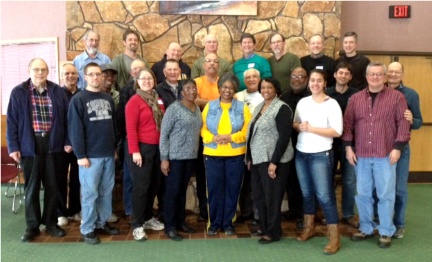 For 15 years pastors and leaders of Christian ministries in Washtenaw County have been stepping aside from the press of ministry to take several days simply to be before the Throne of God and seek his face on behalf of our County. The annual Pastors Prayer Summit, as it is called, drew together 25 leaders from widely different backgrounds to pray with one voice for most of 3 days at the beginning of February.
The Summit got off to a late start on Monday, 2/3 due to 14 inches of snow which blanketed the area Sunday night. However, by mid-afternoon everyone had dug out and were able to make their way down to Michindoh Conference Center near Hillsdale, Michigan. The ‘Summiteers’ are used to persevering, not only through the usual poor weather that time of year, but through other obstacles, personal and spiritual. Prayer is spiritual warfare. But the Lord is faithful and has worked powerfully in the Summits over the years. May of the participants feel it is a highlight of the year for them.
For 15 years pastors and leaders of Christian ministries in Washtenaw County have been stepping aside from the press of ministry to take several days simply to be before the Throne of God and seek his face on behalf of our County. The annual Pastors Prayer Summit, as it is called, drew together 25 leaders from widely different backgrounds to pray with one voice for most of 3 days at the beginning of February.
The Summit got off to a late start on Monday, 2/3 due to 14 inches of snow which blanketed the area Sunday night. However, by mid-afternoon everyone had dug out and were able to make their way down to Michindoh Conference Center near Hillsdale, Michigan. The ‘Summiteers’ are used to persevering, not only through the usual poor weather that time of year, but through other obstacles, personal and spiritual. Prayer is spiritual warfare. But the Lord is faithful and has worked powerfully in the Summits over the years. May of the participants feel it is a highlight of the year for them.
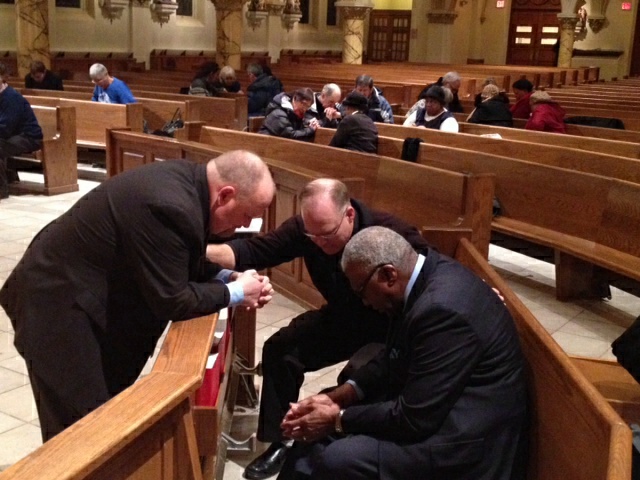 It was snowing and in single digits outside but a faithful band from churches around Washtenaw County gathered at St. Thomas the Apostle Catholic Church on Wednesday, January 22nd to ‘Cry out to the Lord with One Voice’, the twelfth annual Concert of Prayer marking the Octave of Christian Unity, Martin Luther King’s birthday, and the anniversary of Roe v Wade. For more than a decade churches in the Ann Arbor – Ypsilanti area have rotated hosting this evening of intercession to pray for the important issues of the division among Christians, the need for racial reconciliation, the preservation of life and the urgency for transformation in Christ. Interweaving Scripture, worship, brief messages from several pastors and congregational participation, the evening brought people together before the Throne of God, fulfilling Jesus’ command to ‘watch and pray’. You can go to www.pact-washtenaw.org to get information about next year’s Concert of Prayer and other news of inter-church cooperation in Washtenaw County.
It was snowing and in single digits outside but a faithful band from churches around Washtenaw County gathered at St. Thomas the Apostle Catholic Church on Wednesday, January 22nd to ‘Cry out to the Lord with One Voice’, the twelfth annual Concert of Prayer marking the Octave of Christian Unity, Martin Luther King’s birthday, and the anniversary of Roe v Wade. For more than a decade churches in the Ann Arbor – Ypsilanti area have rotated hosting this evening of intercession to pray for the important issues of the division among Christians, the need for racial reconciliation, the preservation of life and the urgency for transformation in Christ. Interweaving Scripture, worship, brief messages from several pastors and congregational participation, the evening brought people together before the Throne of God, fulfilling Jesus’ command to ‘watch and pray’. You can go to www.pact-washtenaw.org to get information about next year’s Concert of Prayer and other news of inter-church cooperation in Washtenaw County.



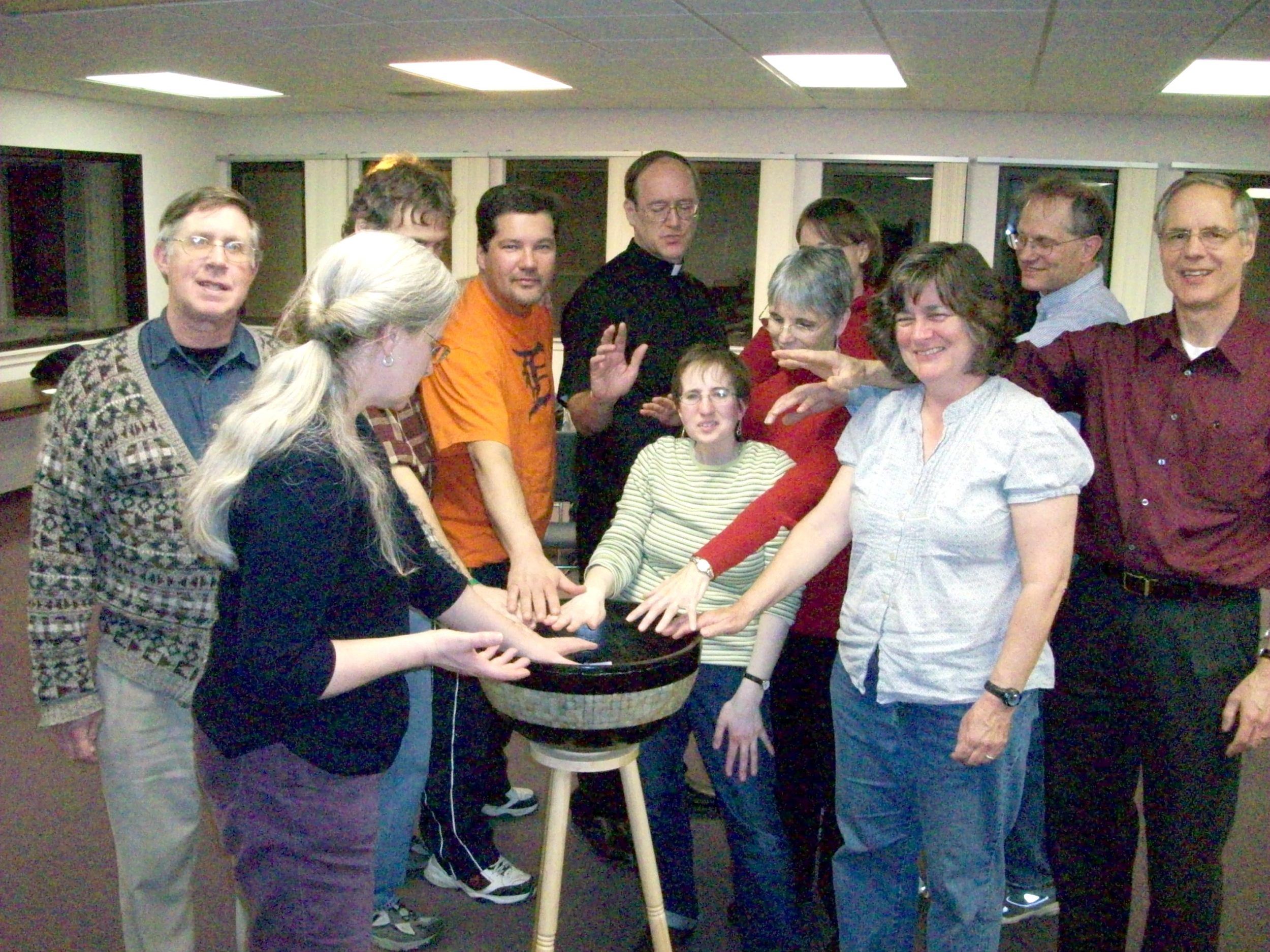
 Giving Everyone a Chance to Hear – and to experience- God’s love in Southeast Michigan is the goal of EACH. It really amounts to the Church being the Church, witnessing in word and deed to God’s saving work in Jesus Christ. And a lot is happening. The 530+ churches and ministries involved in EACH have been telling their 2WordStories, tens of thousands of folks have come to the 2WordStory.com site, there have been medical clinics and resource fairs, site clean-ups, and even
Giving Everyone a Chance to Hear – and to experience- God’s love in Southeast Michigan is the goal of EACH. It really amounts to the Church being the Church, witnessing in word and deed to God’s saving work in Jesus Christ. And a lot is happening. The 530+ churches and ministries involved in EACH have been telling their 2WordStories, tens of thousands of folks have come to the 2WordStory.com site, there have been medical clinics and resource fairs, site clean-ups, and even 
 20,000 people crowded outside Comerica Park in downtown Detroit, but they weren’t waiting for the Tigers to play. There were there to pray for the Lion to roar!
Saturday April 16, the day before Christians celebrate Jesus’ triumphal entry into Jerusalem, people from all over Southeast Michigan gathered in Detroit to cry out for the Lion of Judah to enter and heal our region. They came from city and suburb, from different races, and from different denominations, but they came together with one heart. Everyone A Chance to Hear (EACH) had united them in a common vision to pray for our region, to share the good news, and to express the Gospel in good deeds over the 40 days after Easter. Now was the time to root the campaign in prayer with one voice.
20,000 people crowded outside Comerica Park in downtown Detroit, but they weren’t waiting for the Tigers to play. There were there to pray for the Lion to roar!
Saturday April 16, the day before Christians celebrate Jesus’ triumphal entry into Jerusalem, people from all over Southeast Michigan gathered in Detroit to cry out for the Lion of Judah to enter and heal our region. They came from city and suburb, from different races, and from different denominations, but they came together with one heart. Everyone A Chance to Hear (EACH) had united them in a common vision to pray for our region, to share the good news, and to express the Gospel in good deeds over the 40 days after Easter. Now was the time to root the campaign in prayer with one voice. The day didn’t start out promisingly. It was pouring down rain. This was particularly ironic because Chuck Gaidica, the weatherman for Channel 4 TV, was the moving force behind the prayer walk! As a sign of blessing, though, God the true Weatherman, caused the rain to stop and the sun to break out just as worship began that morning. The rain held off during the whole prayer walk down Woodward to Hart Plaza and back, and then began again afterward. There has been a sense of the Spirit moving as EACH has developed from a handful of churches to over 500, and this seemed to be a further confirmation that the Lord wants to visit Detroit and Southeast Michigan at this time.
The day didn’t start out promisingly. It was pouring down rain. This was particularly ironic because Chuck Gaidica, the weatherman for Channel 4 TV, was the moving force behind the prayer walk! As a sign of blessing, though, God the true Weatherman, caused the rain to stop and the sun to break out just as worship began that morning. The rain held off during the whole prayer walk down Woodward to Hart Plaza and back, and then began again afterward. There has been a sense of the Spirit moving as EACH has developed from a handful of churches to over 500, and this seemed to be a further confirmation that the Lord wants to visit Detroit and Southeast Michigan at this time.
 each VISION brings churches together for Gospel
“And the word of the Lord was being spread through the whole region” (Acts 13:49).
each VISION brings churches together for Gospel
“And the word of the Lord was being spread through the whole region” (Acts 13:49). The church in Washtenaw County lost a great servant when Apostle Robert Hill of Christian Love Fellowship went home to the Lord on June 22. Apostle Hill was the founding pastor of Christian Love Fellowship and had ministered in the area from the early 70’s. In addition to raising up and overseeing a number of pastors and churches in different parts of the country, he helped found Power, Inc., a community development ministry here in Washtenaw county.
Apostle Hill was a founding member of the Pastors Alliance for County Transformation and served as the head of its Directional Team until the last few years when he battled ill health. Many of us will remember him from the Hosanna events. He often spoke and sometimes led a choir at these County-wide Palm Sunday celebrations. He was a champion of Christian unity, especially concerned to see the divisions between Afro-American churches and other churches bridged.
The church in Washtenaw County lost a great servant when Apostle Robert Hill of Christian Love Fellowship went home to the Lord on June 22. Apostle Hill was the founding pastor of Christian Love Fellowship and had ministered in the area from the early 70’s. In addition to raising up and overseeing a number of pastors and churches in different parts of the country, he helped found Power, Inc., a community development ministry here in Washtenaw county.
Apostle Hill was a founding member of the Pastors Alliance for County Transformation and served as the head of its Directional Team until the last few years when he battled ill health. Many of us will remember him from the Hosanna events. He often spoke and sometimes led a choir at these County-wide Palm Sunday celebrations. He was a champion of Christian unity, especially concerned to see the divisions between Afro-American churches and other churches bridged.

